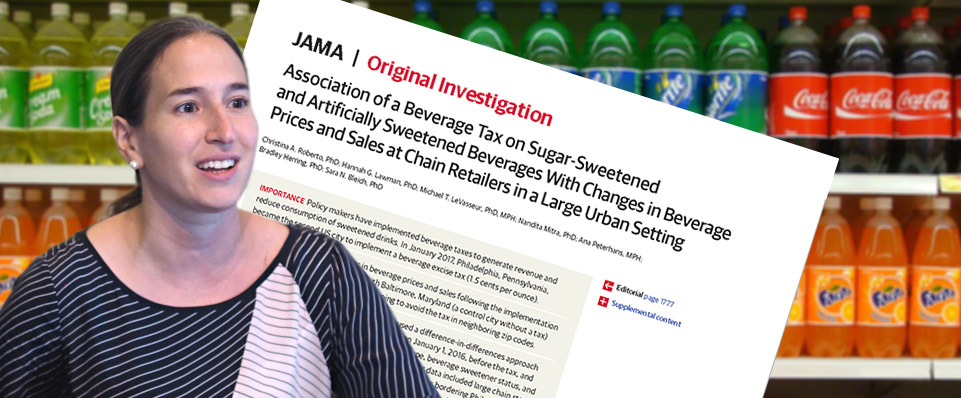News
Philadelphia Soda Tax Debate Drives Scholarly Dissemination Home Run
Christina Roberto's Data Makes News Coast-to-Coast and in China Too

Christina Roberto, PhD, Assistant Professor at the University of Pennsylvania Medical Ethics and Health Policy Department and LDI Senior Fellow led a seven-member research team that analyzed the effects of Philadelphia’s soda tax.
Nothing serves the goal of academic research dissemination quite like publishing a relevant study into the eye of a national news storm. Penn Medicine Assistant Professor and LDI Senior Fellow Christina Roberto, PhD, is a great example of that.
Since arriving at Penn from Harvard in 2015, Roberto, Director of Penn’s Psychology of Eating and Consumer Health (PEACH) Lab has been studying the use of behavioral economic strategies as well as municipal taxes to reduce consumer consumption of sugary drinks. Meanwhile, Philadelphia, which imposed a 1.5 cent-per-ounce tax on soda in 2017, has become the epicenter of a national controversy and a high-stakes political battle over the tax.
In the midst of that debate and the ongoing Philadelphia mayoral electoral campaign, Roberto’s new work was published in the Journal of the American Medical Association under the headline “Association of a Beverage Tax on Sugar-Sweetened and Artificially Sweetened Beverages With Changes in Beverage Prices and Sales at Chain Retailers in a Large Urban Setting.” The findings showed Philadelphia sales of soda and other sugary drinks dropped by 38% since the tax was imposed.
Exactly what those findings mean in the larger world of health care and corporate marketing is part of the debate.
Health Issues
On the health side, the CDC has established that “frequently drinking sugar-sweetened beverages is associated with weight gain/obesity, type 2 diabetes, heart disease, kidney diseases, non-alcoholic liver disease, tooth decay and cavities, and gout, a type of arthritis.”
On the marketing side, MarketWatch forecasts the annual U.S. soft drink market will grow to $388 billion in the next six years but warns “health issues such as obesity, cardiovascular diseases, and others due to high sugar content in drinks are hindering the growth of the market.”
After both the City of Philadelphia and Penn Medicine put out detailed news releases on Roberto’s study simultaneous with its publication; it quickly became headline news in major media outlets coast to coast as well as in Europe, China and India.
Newspapers
U.S newsrooms leaped on the findings, including newspapers and websites like the Philadelphia Inquirer, the Washington Post, Chicago Tribune and the Los Angeles Times. The newspaper pickup was widespread because wire services like the Associated Press, Reuters and UPI pushed the story across the country where it appeared in papers large and small, like the Southeastern Missourian.
Similarly, it became a major story across the TV networks, including CNN, CNBC, CBS, ABC, and NBC, as well as mass media magazines including Time, Forbes and Popular Science, and even trade magazines such as Vending Market Watch and Industrial Equipment News.
Around the world
Internationally, Agence France-Presse, which syndicates news in six languages throughout Europe, Africa and Asia, put the story out where it was picked up by publications like The Times of Malta. Additionally, Beijing based-Sohu, a Google-like search engine and news platform, did its own story (turn on your browser’s language translation function — the Chinese headline is “The Effect is Remarkable! After Soda Tax, Sales of Surgery Drinks in Philadelphia Fell by 40%”). The Economic Times of India took an immediate interest and did a story; the issue of excessive sugar intake is such a controversial one in India that the Straits Times of Singapore has dubbed India the “diabetes capital of the world.”